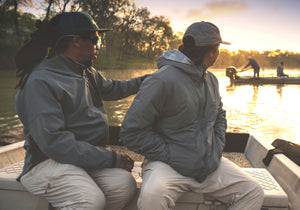The UK’s freshwater rivers and streams are among the most popular fly fishing beats. And with rich supplies of trout and other freshwater species, it’s easy to see why. But as an island, the UK is also sitting on a bounty of fantastic saltwater fly fishing spots.
So what do you need to switch from freshwater to saltwater fly fishing? Find out all the differences between freshwater vs saltwater fly fishing here.
Freshwater vs saltwater fly fishing: what’s the difference?
The general fly fishing technique is similar regardless of where you fish. No two beats/marks are the same: you’ll need to carefully study your surroundings to make the best choices when it comes to location, gear, and direction.
Like freshwater fishing, the sea is best fished on breezy, overcast days where there’s wind on the water.
But there are several differences between freshwater and saltwater fly fishing you’ll need to consider before you get started, including:
- Species
- Gear
- Strategy
Let’s explore each of the differences between freshwater and saltwater fly fishing in more depth.
Fish species in saltwater vs freshwater
UK freshwater rivers contain a wealth of fish species, including trout, salmon, grayling, and carp. But there are few freshwater fish types compared with marine species, thanks to the sheer vastness and variety of ecosystems in the sea.
Common saltwater fish in the UK include mackerel, mullet, bass, pollock, coalfish, sea trout, and flounder.
Each type of fish is best caught using a particular setup, so if you regularly fish freshwater beats, make sure you’re prepared with the best flies for these other species.
Equipment for saltwater vs freshwater fly fishing
Flies
Marine fish prey on small molluscs and shellfish, such as crab and shrimp, as well as plankton and other small fish. As a result, saltwater flies are often bigger than freshwater flies, which emulate insects like mayflies and damselflies.
You should generally use a larger hook size to catch marine fish, as they tend to be stronger than freshwater fish. It’s recommended to use at least a hook size 6 for saltwater fly fishing.
Take a look at some of our preferred fly collections for each environment:
- River Fly Collection — freshwater
- Chalkstream Fly Collection — freshwater
- Sea Bass Collection — saltwater
Learn more about how to choose the best saltwater fly.
Reel
River fish are typically smaller and less powerful than marine fish, so they can often be hand-lined in. If you are using a reel, you won’t need as much drag as with saltwater fly fishing.
Marine fish often require more drag to tire them out before netting them, so you might want to choose a longer, stronger drag reel. Salt in seawater can also corrode your gear. Prevent this by choosing an anodised reel, such as a Mirage LT reel.
Line
Saltwater is more buoyant than freshwater due to its salinity, therefore, fly lines don't sink at the same rate as they do in freshwater. There’s also wave movement to contend with, so a sink tip or sinking line can cut through the waves and get your flies into the fish feeding zone.
A sinking line like the Pro Depth Charge 3D Fly Line is often preferable for saltwater fly fishing.
Equipment aftercare
When you’ve been fishing in a saltwater environment, you must wash your gear down with freshwater afterwards. Saltwater can quickly corrode and damage your equipment, so this is an essential step every time you fish in saltwater.
Your fly fishing strategy
It’s not just your equipment that needs to be attuned to the saltwater environment if you’re used to freshwater fishing. You’ll also need to base your strategy around the tides.
Marine fish tend to move closer to the shore as the tide comes in, as the incoming waters kick up prey like worms, shrimp, and plankton from the seabed. The stronger the tide, the more fish you’re likely to see. Seek local knowledge to find out the best time to fish in the local area.
Choosing the right fishing spot is also important. In freshwater rivers, locate the feeding streams in fast-flowing currents. In saltwater environments, find choke points where fish are waiting for prey. Ensure your fly will reach the fish in a natural direction (i.e. with the current) to increase the chances they’ll spot and take the fly.
Should you try saltwater fly fishing?
At Orvis, we believe all fly anglers should experience the buzz of saltwater fly fishing. Every year, we hold our Beginners’ Saltwater Weekend to introduce new anglers to the thrill of marine fishing. We also host the annual Saltwater Fly Fishing Festival for anglers of all levels.
Want to try your hand at saltwater fly fishing? Check out our saltwater fly fishing collection to replenish your tackle box with everything you need.
